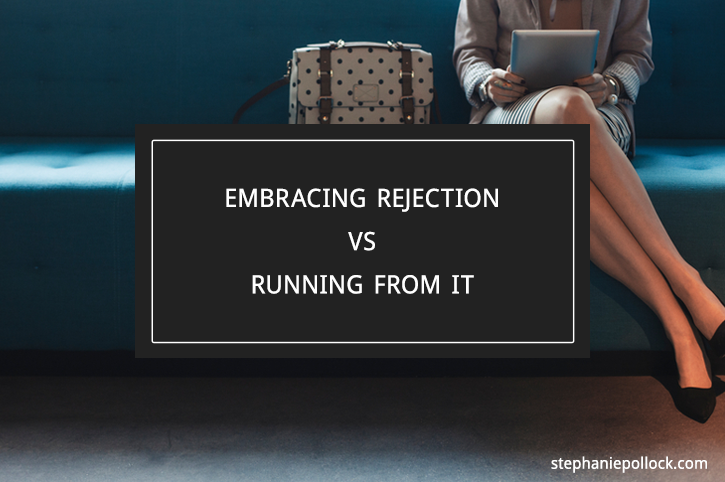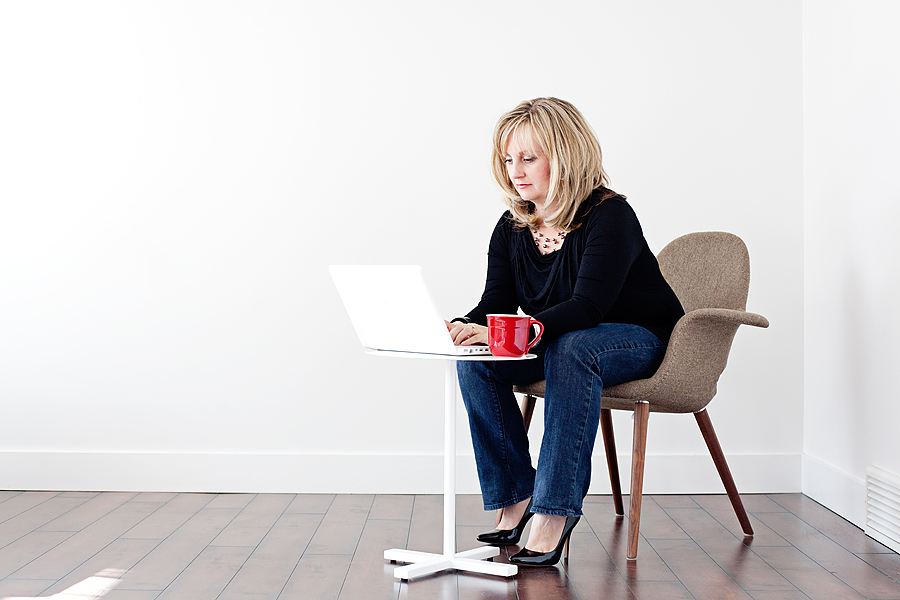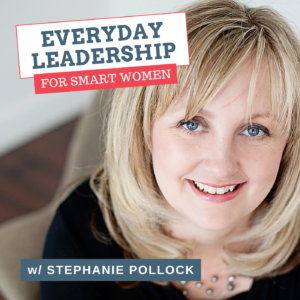“What’s the point?”
That’s the question a friend posed to me after receiving the second rejection for her work. She had been brave. She had put herself out there. And her proposal was rejected. Twice. In a week.
She was ready to give it all up. After this second rejection, she wrote herself a story that said, “I must be doing this wrong. I don’t see the point of continuing.”
This story had her spinning and feeling understandably deflated. She was having a serious vulnerability hangover and couldn’t fathom the idea of putting herself out there again only to possibly be rejected a third time.
Now there’s an important element to this story I haven’t shared yet. Interestingly, this same friend was on a quest to get 100 stickers on her “Be Brave” chart. She was well underway with over 40 stickers representing small (and big) acts of bravery colourfully filling up her sheet of paper.
And every one of those 40 stickers required her to step outside her comfort zone, look fear right in the face and say, “Not today. Today I am being brave.” And she was! I watched her beam when she’d share a sticker that represented a big brave ask or task. You could see the sense of pride on her face when she held up the sheet to our Mastermind group, showcasing the rainbow representation of courage-in-action.
It was amazing to witness. We cheered her on, and her fellow members remarked on her commitment and willingness to try new things.
But she hadn’t been rejected yet…
Of course, she knew the rejections would come – that getting some no’s would be the price she would pay to use up all 100 stickers.
But knowing we might get rejected and actually getting rejected are two different things. It’s always immensely easier to tell ourselves ahead of time that we can handle setbacks, criticism, and rejection when they show up. Until they do.
And then they knock us down to the ground, leaving us unable to catch our breath and feeling dizzy from the shame spiral that threatens to kibosh action and sidestep bravery for comfort and safety.
We have all been there. Whether in life, love or work. Rejection shows up, kicks our ass and leaves us wondering, “What’s the point?”
And the risk is that we let the emotional fallout of rejection – fear, shame, embarrassment, imposter complex, disappointment, sadness – keep us from getting back up and trying again.
Happily, my friend didn’t let rejection win. She’s smart and brave like that.
We had a quick pep talk where I said,
“I know it’s hard. Putting yourself out there IS hard – but that doesn’t mean you’re doing it wrong. The point is because you’ll never get any yeses without any nos. And the point is that you are demonstrating courage and stretching yourself and growing and being a role model for bravery – regardless of the outcome.
Take a day off, and then dust off and get another sticker on that chart tomorrow. I’m not going to let you give up on yourself. You’ve worked too hard and put too much of yourself in this to give up now.
You can do this because you ARE doing this. You will not die if get 25 more rejections. You aren’t supposed to get all yeses. But you will get stronger and braver for every no you get.
Feel free to ignore this message today and have a day to wallow a bit. Tomorrow, read it and start again.”
That’s exactly what she did. She took a day off to feel the disappointment and then she got right back to it the next day, determined to add 60 more stickers even if some of them are hard won.
She is in the arena, getting her butt kicked and as Brené Brown would say, “daring greatly.” And she inspires me and others every day because of her bravery.
Why does rejection hit us so hard?
My friend is not alone in her feelings about being rejected.
Very few of us can bounce back easily from rejection, particularly if it’s high stakes (saying “I love you for the first time” for example), or taps a core value or sense of identity we hold (“I’m really successful at work – I usually get what I go after”).
And as if the emotional rollercoaster wasn’t enough, science shows that rejection piggybacks on physical pathways in the brain. “MRI studies show that the same areas of the brain become activated when we experience rejection as when we experience physical pain. This is why rejection hurts so much (neurologically speaking).”
Being rejected also compromises our sense of belonging. Given that we are, as Brené would also say, hardwired to connect, rejection cuts so deep because it makes us question where we fit in the world if we aren’t ‘good enough’ to get the yes. As social beings, we want to fit in and be accepted, and getting rejected feels like the opposite of belonging.
Want one more reason rejection hurts so much? According to another study, subjects were rejected by strangers (who were actors hired by the researchers) and even after being told that the rejection wasn’t real, the subjects weren’t able to emotionally bounce back, proving that rejection doesn’t respond well to reason (and even more surprisingly, actually temporarily decreases our IQ).
Bottom line? If you’ve ever beaten yourself up for how you’ve handled rejection, give yourself some grace – this is not easy work!
How to embrace rejection (vs run from it)
Good news. All is not lost – there are specific things you can do to better manage the fear of rejection and the aftershocks when it arrives on your doorstep. Here are a few:
> Make rejection-getting your next quest
When I first started my coaching business, I used to be terrified to shift a free discovery call with a potential new client from the “get to know you” stage into “want to work with me?” stage. I was so worried I’d botch it up and then they’d say no, that I raced through that portion of the call or avoided it all together hoping that an email follow-up could do the selling part for me.
Now, I don’t even flinch when I shift to the sales part of a conversation. And while I’ve certainly improved my message and delivery over time, what is really at the heart of the shift is simple: practice.
Every single time I ask for the sale – regardless of the outcome – it gets easier.
If I were to only put myself in the position of being rejected on occasion, I doubt the sting of rejection would have left me.
Instead, I’ve faced the no’s (and celebrated the yes’s) enough to become desensitized when someone isn’t ready or doesn’t want to work with me. It’s lost the powerful hold it used to have on me, and now is simply the cost of doing business.
So put the time in. Make rejection-getting a quest and mission to desensitize yourself from the fear that holds you back.
Want some inspiration? Watch Jia Jing’s powerful TED Talk, “What I learned from 100 days of rejection” and follow his lead.
Where are your opportunities to risk rejection this week?
How can you be brave and go for them?
> Brave the ask
Last week I attended Chic Geek’s Geeky Summit, a one-day event here in Calgary that recognizes and celebrates women who are advancing technology and entrepreneurship.
The theme of this year’s summit was, “Brave the ask,” encouraging participants to write an important ask on the back of a card and slip it into the jars provided on each table. At the end of the day, the founder and CEO, Kylie Woods, got up on stage, read out the asks and waited until at least one of the 200+ attendees stepped up to offer help.
And no surprise, every single ask got answered. Every woman brave enough to be vulnerable and ask for what they needed whether that be a connection, a job, a referral or something else, was connected with another woman happy to help.
Rejection requires you to brave the ask. And yes, sometimes you do get a no. But the real truth is that you’re getting the no already if you aren’t making the ask. There is no room for a yes without a possible no.
What’s a brave ask you can make today?
> Have a soft place to fall
Despite everything I’ve said about how you can embrace rejection, I’m not about to minimize how much it hurts – especially at the beginning.
This is why having a soft place to fall – a person or people that you can turn to and share the hurt and fear without judgment.
In Rising Strong, Brené’s book about how to get back up after we fall down, she always recommends we reach out to someone we trust, someone “who has earned the right to hear our story and who as the capacity to respond with empathy.”
As you stretch yourself, don’t go it alone. Buddy-up, hire a coach, join a mastermind, talk to your partner – whatever you need to have a place to go when the “no” hits you especially hard and you ask yourself, “What’s the point?”
Who can you turn to when you take a risk, brave the ask and find yourself staring a tough rejection right in the face? Who can hold space for both empathy and encouragement?
> Practice self-compassion
As I wrote this sub-head, a giggle escaped from my mouth. Why? Because if my capacity to be self-compassionate could be graded, I’d get a big, fat F.
And yet, I write it because I know it unlocks the stronghold the fear of rejection can have on us. Our capacity to bounce back from rejection is directly correlated with our capacity to give ourselves grace and extend loving compassion, even when it feels like the world is turning against us.
Self-compassion comes through practice (yes, more practice…always through practice do we grow).
Here are a few ways we can practice self-compassion:
- Get curious rather than critical: Ask yourself, “What is here for me to learn?”
- Invest in radical self-care and mindfulness. I don’t mean a $500 spa day (unless that’s your jam), but rather an ongoing commitment to putting your own well-being first (emotional, physical, spiritual) – however that looks for you. Here’s a 20-minute meditation to help you cultivate self-compassion via Dr. Kristin Neff.
- Use the empathy you offer others for yourself. What would you tell a friend who called, frozen in fear and doubt, after getting rejected? What words of comfort would you offer her? How would you help her get back up?
- Celebrate! Getting a big “no” might leave you feeling like there’s nothing to celebrate when the truth is that your courage to make the ask is a huge win. Celebrate that you took the risk.
Where can you give yourself some grace?
There is no reward without the possibility of rejection
Anything you really want from this life lives on the other side of your willingness to risk rejection by showing up fully and bravely. Think about it – if you were to reflect back on some of your sweetest successes you could also identify the moment or moments where it could have turned the other way.
If you begin to embrace rejection rather than run from it, you’ll begin to see that it’s not a measure of your character, talent or worthiness, but rather your capacity to be both brave and vulnerable.
“The funny thing is that rejection is not so bad, really. This is something I think men have always understood — that a glorious failure can sometimes be more life-affirming than a cautious win. This is why men are constantly asking for stuff they might not even deserve or aren’t totally qualified to handle. I don’t say this as an insult to men, either; I wish more women would do the same. Because sometimes you get a yes, and even if you weren’t prepared for that yes, you rise to the occasion. You aren’t ready, and then you are. It’s irrational, but it’s magical.” — Elizabeth Gilbert



